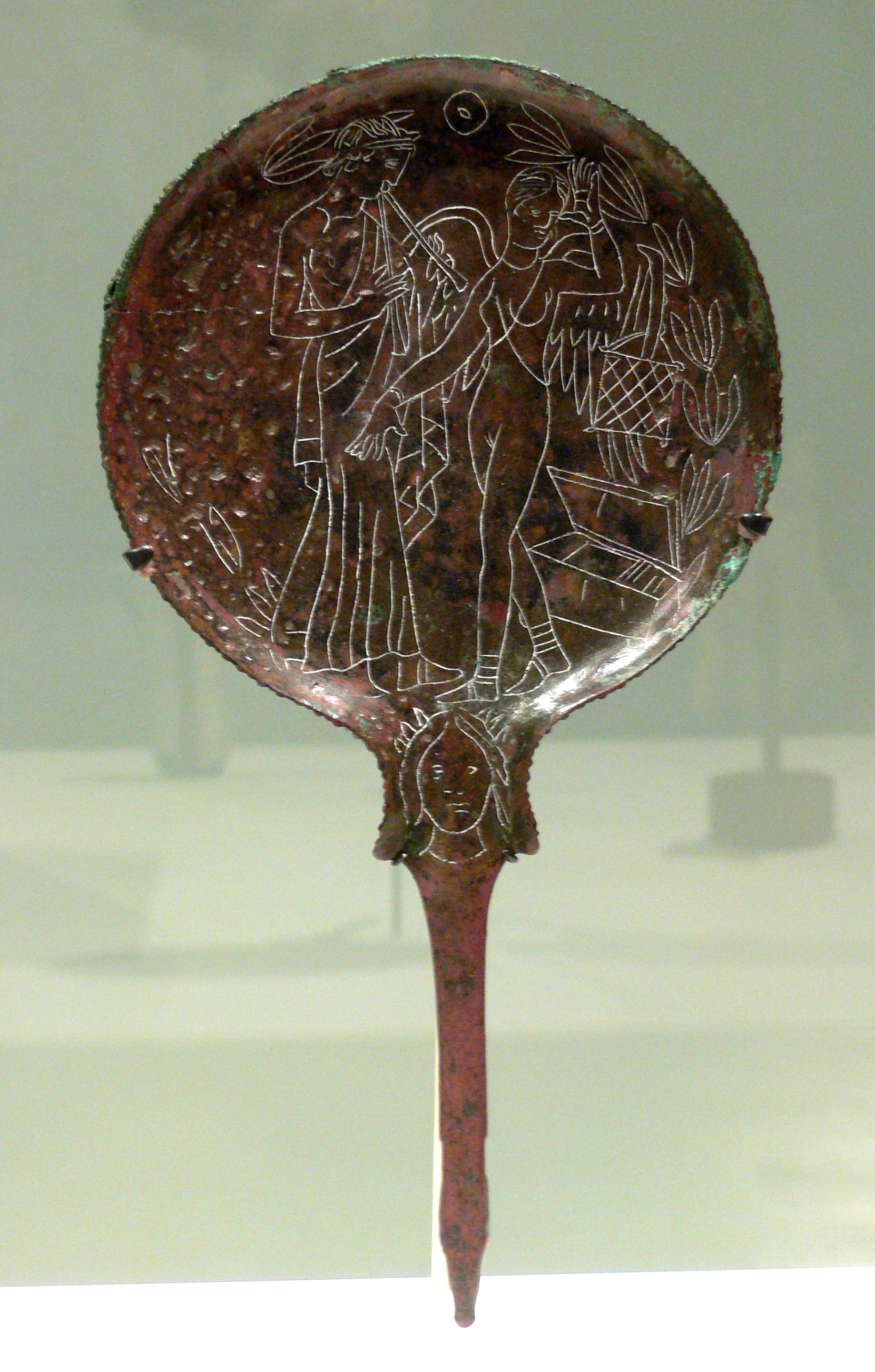Sappho, fr. 16
Some say a force of horsemen, some say infantry
and others say a fleet of ships is the loveliest
thing on the dark earth, but I say it is
the one you love
It is altogether simple to make this understood
since she whose beauty outmatched all,
Helen, left her husband
a most noble man
And went sailing to Troy
Without a thought for her child and dear parents
[Love] made her completely insane
And led her astray
This reminds me of absent Anactoria
I would rather watch her lovely walk
and see the shining light of her face
than Lydian chariots followed by
infantrymen in arms
Οἰ μὲν ἰππήων στρότον, οἰ δὲ πέσδων,
οἰ δὲ νάων φαῖσ’ ἐπὶ γᾶν μέλαιναν
ἔμμεναι κάλλιστον, ἐγὼ δὲ κῆν’ ὄτ-
τω τις ἔραται
πά]γχυ δ’ εὔμαρες σύνετον πόησαι
πά]ντι τ[οῦ]τ’· ἀ γὰρ πολὺ περσκέθοισα
κά]λλος ἀνθρώπων Ἐλένα [τὸ]ν ἄνδρα
τὸν πανάριστον
/ [κρίννεν ἄρ]ιστον
καλλίποισ’ ἔβας ‘ς Τροίαν πλέοισα
/ ὂσ τὸ πὰν] σέβασ τροΐα[σ ὄ]λεσσ[ε,
κωὐδὲ παῖδος οὐδὲ φίλων τοκήων
πάμπαν ἐμνάσθη, ἀλλὰ παράγαγ’ αὔταν
οὐκ ἀέκοισαν
/ πῆλε φίλει]σαν
Κύπρις· εὔκαμπτον γὰρ ἔφυ βρότων κῆρ
] κούφως τ . . . οη . . . ν
κἄμε νῦν Ἀνακτορίας ὀνέμναι-
σ’ οὐ παρεοίσας
/ Ὠροσ. εὔκ]αμπτον γαρ [ἀεὶ τὸ θῆλυ]
αἴ κέ] τισ κούφωσ τ[ὸ πάρον ν]οήσῃ.
οὐ]δὲ νῦν, Ἀνακτορί[α, τ]ὺ μέμναι
δὴ] παρειοῖσασ,
τᾶς κε βολλοίμαν ἔρατόν τε βᾶμα
κἀμάρυχμα λάμπρον ἴδην προσώπω
ἢ τὰ Λύδων ἄρματα κἀν ὄπλοισι
πεσδομάχεντας.
Attested compounds from the LSJ 1902:
φιλαλεξάνδρος: philaleksandros, “Alexander-lover”
φιλαλήθης: philalêthês, “lover of truth”
φιλαναγνώστης: philanagnôstês, “love of reading”
φιλαμαρτήμων: philamartêmôn, “lover of sin”
φιλανθής: philanthês, “flower-lover”
φιλαπεχθημοσύνη: philapekhthêmosunê, “fond of making enemies”
φίλαυτος: philautos, “self-lover”
φιλέρημος: philerêmos, “lover of solitude”
φίλερις: phileris, “lover of conflict”
φιληδονία: philêdonia, “lover of pleasure”
φιλόβιβλιος: philobiblios, “book-lover”
φιλοβόρβορος: philoborboros, “lover of dirt”
φιλόγλυκυς: philoglukus, “sweet-lover”
φιλογύνης: philogunês, “woman-lover”
φιλοδένρος: philodendros, “tree-lover”
φιλόδροσος: philodrosos, “lover of dew”
φιλοζωία: philozôia, “lover of life”
φιλόθακος: philothakos, “lover of sitting”
φιλοιφής: philoiphês, “lover of sexual intercourse”
φιλόκενος: philokenos, “lover of emptiness”
φιλόκηπος: philokêpos, “lover of gardens”
φιλόκροτος: philokrotos, “lover of noise”
φιλοκύων: philokuôn, “lover of dogs”
φιλόλογος: philologos, “lover of words”
φιλόλουτρος: philoloutros, “lover of baths”
φιλομαθής: philomathês, “lover of learning”
φιλόμαστος: philomastos, “breast-loving”
φιλόμβρος: philombros, “rain-loving”
φιλόμηρος: philomêros, “Homer-loving”
φιλομήτωρ: philomêtôr, “mother-loving”
φιλονέος: philoneos, “youth-loving”
φιλομόχθηρος: philomokhthêros, “loving bad men”
φιλομύθος: philomuthos, “story-lover”; also “fond of talking”
φιλόξενος: philoksenos: “Stranger-lover”
φιλοπενθής: philopenthês, “grief-lover”
φιλοπλάκουντος: philoplakountos, “cake-lover”
φιλοπολύγελως: philopolugelôs, “lover of great laughter”
φιλοπόνος: philoponos, “work-lover”
φιλοπόρνος: philopornos, “lover of harlots”
φιλοπρεπής: philoprepês, “lover of propriety
φιλορρώθων: philorrôthôn, “nose-lover”
φιλορχηστής: philorkhêstês, “dance-lover”
Palaiophron posted this last year.
Basil Gildersleeve, Hellas and Hesperia
“No lover can avoid the catalogue of the charms of his mistress. Petrarch is eloquent in sonnet and canzone on the subject of Laura’s eyes. Shall our mistress lack eyes? Again, your true lover is sublimely indifferent to the fact that the audience is utterly unacquainted with the object of his adoration, and so even after many years of close communion with Greek, I was capable in 1869 of holding forth ecstatically on its physical charms, for I am enough of a heathen to recognize in physical beauty the only true incentive of love. It is the physical beauty of Greek that constitutes its intimate attraction, that redeems, for instance, the tedious obviousnesses of the old man eloquent, and I could still rhapsodize, as I did forty years ago, on the sequences of vowels and the combinations of consonants, the concert of mute and liquid, the clear-cut outline of every word in Greek, clear and sharp as the sky-line of the mountains of Greece, as the effigies on Greek coins. I could still wax lyrical about the paradigm of the Greek verb. The Greek verb is, indeed, a marvel.
‘Flexible and exact, simple in its means, abundant in its applications, with varying tones for colorless statement, for eager wish, for purpose, for command, now despatching the past with impatient haste, now unrolling it in panoramic procession, but bringing forth its treasure of vowels and diphthongs to mark the striving of the will, the thought, the desire, toward the future,’ and so on and so on. Perhaps discourse like this might rouse the curiosity of the student and win here and there a friend for Greek. The teacher can never know whether shall prosper either this or that. I remember to have read in Gogol’s ‘Dead Souls’ a eulogy of Russian that would have Inspired me, if I had been endowed with ample leisure, to attempt the acquisition of that difficult idiom. But I am not quite sure that this unverifiable laudation Is the right way to lend vitality to the study. ‘The king’s daughter is all glorious within.’ But he that is without remains cold as a rule. The love of a language from this point of view is a matter of individual experience, a business to be transacted under four eyes only, and as much of the physical beauty of a language depends on the pronunciation, it may be well to relegate the whole thing to the realm of ‘fancy,’ that admirable old word for love. I will, therefore, waive the whole subject of the perfection of the Greek language, both in Its form and Its function, the wealth of its vocabulary, and the flexibility of its syntax, and limit myself to a few remarks on the relation of Greek to our daily life.”

Like this:
Like Loading...











